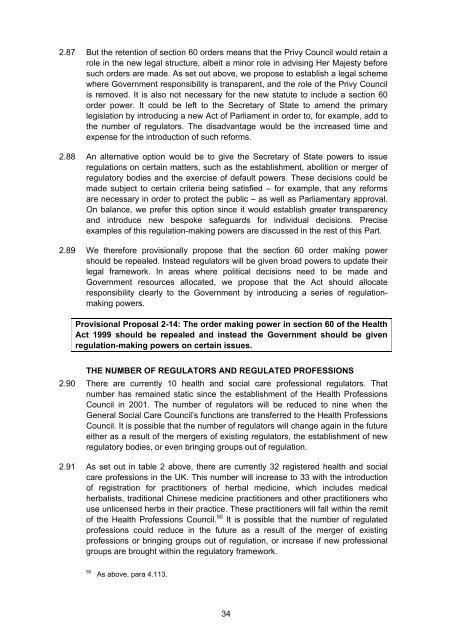Regulation of Health and Social Care Professionals Consultation
Regulation of Health and Social Care Professionals Consultation
Regulation of Health and Social Care Professionals Consultation
Create successful ePaper yourself
Turn your PDF publications into a flip-book with our unique Google optimized e-Paper software.
2.87 But the retention <strong>of</strong> section 60 orders means that the Privy Council would retain a<br />
role in the new legal structure, albeit a minor role in advising Her Majesty before<br />
such orders are made. As set out above, we propose to establish a legal scheme<br />
where Government responsibility is transparent, <strong>and</strong> the role <strong>of</strong> the Privy Council<br />
is removed. It is also not necessary for the new statute to include a section 60<br />
order power. It could be left to the Secretary <strong>of</strong> State to amend the primary<br />
legislation by introducing a new Act <strong>of</strong> Parliament in order to, for example, add to<br />
the number <strong>of</strong> regulators. The disadvantage would be the increased time <strong>and</strong><br />
expense for the introduction <strong>of</strong> such reforms.<br />
2.88 An alternative option would be to give the Secretary <strong>of</strong> State powers to issue<br />
regulations on certain matters, such as the establishment, abolition or merger <strong>of</strong><br />
regulatory bodies <strong>and</strong> the exercise <strong>of</strong> default powers. These decisions could be<br />
made subject to certain criteria being satisfied – for example, that any reforms<br />
are necessary in order to protect the public – as well as Parliamentary approval.<br />
On balance, we prefer this option since it would establish greater transparency<br />
<strong>and</strong> introduce new bespoke safeguards for individual decisions. Precise<br />
examples <strong>of</strong> this regulation-making powers are discussed in the rest <strong>of</strong> this Part.<br />
2.89 We therefore provisionally propose that the section 60 order making power<br />
should be repealed. Instead regulators will be given broad powers to update their<br />
legal framework. In areas where political decisions need to be made <strong>and</strong><br />
Government resources allocated, we propose that the Act should allocate<br />
responsibility clearly to the Government by introducing a series <strong>of</strong> regulationmaking<br />
powers.<br />
Provisional Proposal 2-14: The order making power in section 60 <strong>of</strong> the <strong>Health</strong><br />
Act 1999 should be repealed <strong>and</strong> instead the Government should be given<br />
regulation-making powers on certain issues.<br />
THE NUMBER OF REGULATORS AND REGULATED PROFESSIONS<br />
2.90 There are currently 10 health <strong>and</strong> social care pr<strong>of</strong>essional regulators. That<br />
number has remained static since the establishment <strong>of</strong> the <strong>Health</strong> Pr<strong>of</strong>essions<br />
Council in 2001. The number <strong>of</strong> regulators will be reduced to nine when the<br />
General <strong>Social</strong> <strong>Care</strong> Council’s functions are transferred to the <strong>Health</strong> Pr<strong>of</strong>essions<br />
Council. It is possible that the number <strong>of</strong> regulators will change again in the future<br />
either as a result <strong>of</strong> the mergers <strong>of</strong> existing regulators, the establishment <strong>of</strong> new<br />
regulatory bodies, or even bringing groups out <strong>of</strong> regulation.<br />
2.91 As set out in table 2 above, there are currently 32 registered health <strong>and</strong> social<br />
care pr<strong>of</strong>essions in the UK. This number will increase to 33 with the introduction<br />
<strong>of</strong> registration for practitioners <strong>of</strong> herbal medicine, which includes medical<br />
herbalists, traditional Chinese medicine practitioners <strong>and</strong> other practitioners who<br />
use unlicensed herbs in their practice. These practitioners will fall within the remit<br />
<strong>of</strong> the <strong>Health</strong> Pr<strong>of</strong>essions Council. 50 It is possible that the number <strong>of</strong> regulated<br />
pr<strong>of</strong>essions could reduce in the future as a result <strong>of</strong> the merger <strong>of</strong> existing<br />
pr<strong>of</strong>essions or bringing groups out <strong>of</strong> regulation, or increase if new pr<strong>of</strong>essional<br />
groups are brought within the regulatory framework.<br />
50 As above, para 4.113.<br />
34
















